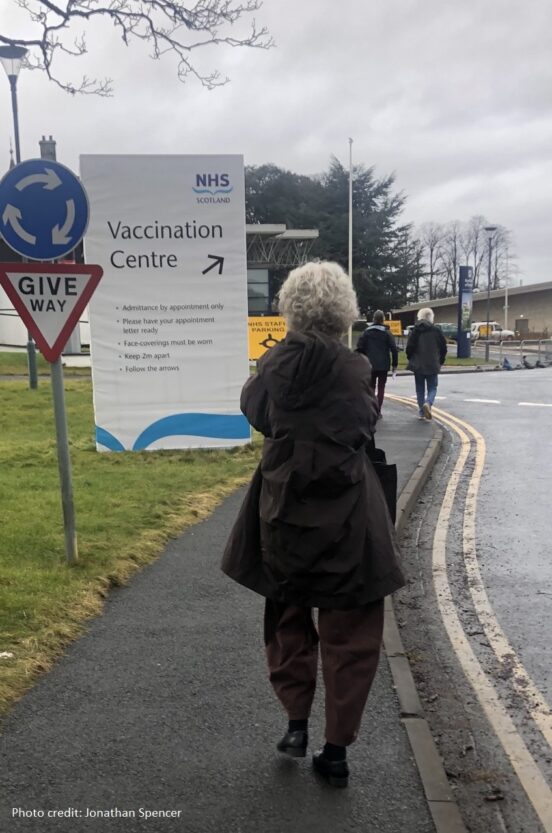21st February. Yesterday we went to get vaccinated. Despite the grey, damp Edinburgh morning, it seemed like a day of celebration from which we (my husband, Jonathan, and I) emerged elated. A red letter day on a calendar with almost nothing marked on it. Everything at the mass-vaccination centre on the outskirts of the city seemed to run on oiled wheels. We arrived a little early for our simultaneous and precisely-timed 8.51 appointments; by 8.51 we were already on our way out. Staff were cheerful and kind. A volunteer vaccinator who told me she was a dentist, normally on a four-day week, checked routine questions before giving me my injection. Had I had any vaccinations in the last six months? ‘No’, I responded without hesitation. She enquired brightly about a possible flu jab in the autumn. I had forgotten that, and we laughed.
So much gets forgotten in the strange, elastic time that we have been living for the last year. A time out of time, as many have said, much of it hard to differentiate in retrospect, marked by different small rhythms. The daily ones of domesticity that tend to merge into each other – work, reading and writing, mealtimes, evening films. When did we see that? When did I read that? Monthly rhythms – the changing seasons, the expansive luxury of long novels, Dickens suddenly and unexpectedly coming into his own. Markers of time. The walks that have been repeated daily and are seasonal too – occasions to note small changes in the neighbourhood or to lose oneself entirely in trains of thought. A time of multiple immersions when immersion itself seemed like a good way to lose time, lose oneself.
Vaccinations have also marked off different generations of family time through the 20th century. In the past few weeks, since they have been on the horizon, I’ve been thinking about my mother, Ruth, a polio victim in 1916 or 1917 at the age of five. But she didn’t think of herself in those terms, and in any case referred to her affliction by the older (and already outdated) term, ‘infantile paralysis’. Despite life-changing illness in early childhood, family tragedy in her twenties, losing her right to citizenship, and becoming a refugee in the 1930s, Ruth never saw herself as a victim, but as unbelievably lucky. She spoke occasionally of her vivid memory of the last day she had been able to run before being struck by the diphtheria that had been closely followed by polio. And she was a fierce advocate of immunisations. Born in the mid-1950s, I would have been among the first groups of children in Britain to receive a routine vaccination for polio in early childhood – with no parental doubts about the benefits. Not long after her death, those recollections of my mother’s, and my own childhood memories, were brought to mind when, in the mid-1990s, I took our baby daughter for her inoculations. The nurse at the GP clinic, whom I told then, became visibly and surprisingly moved. I recall those memories again now, in 2021, as we are among the first people in the world to receive vaccinations for Covid19 in an immaculately organised centre with wonderfully friendly and efficient staff. What unbelievable luck.
Janet Carsten is a professor of social and cultural anthropology at the University of Edinburgh. She is also a Fellow of the British Academy, and author of many books including Blood Work: Life and Laboratories in Penang (2019).





Comments by Hashemi